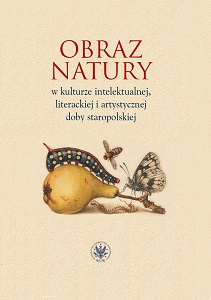Pieśń o potopie. Od Jana Kochanowskiego do Stanisława Grochowskiego
Flood Psalm. From Jan Kochanowski to Stanisław Grochowski
Author(s): Monika Szczot
Subject(s): Cultural history, Studies of Literature, Theory of Literature
Published by: Wydawnictwa Uniwersytetu Warszawskiego
Keywords: flood; Ovid; Horace; Old Polish literature; Kochanowski; Grochowski; natural disaster; catastrophe; imitation; emulation; harmonious co-existence of world and man; rhetoric; literary tradition
Summary/Abstract: A flood myth is one of the most popular and best known motifs in the history of human kind. It occurs in the Bible (Genesis 6-9) and in Greek mythology, in the story of Deucalion and Pyrrha, which was described in Ovid’s Metamorphoses (I, 216−245) and in Horace’s Carmina (I, 2). The ancient tradition is present in two old Polish flood psalms, which are analysed in this article. Jan Kochanowski in the Flood Psalm (Carmina II, 1) and Stanisław Grochowski in Lamentable Camena on Severe Flood in Anno Domini 1605 artfully unite descriptions of disasters at that time with literary tradition, placing their works between occasional writings and classic topique, which shows nature in its horror (locus horridus). Kochanowski’s elaborate psalm inspires Grochowski to imitate and emulate it as the author of Lamentable Camena… is inspired by various sources and, as a result, improves the rhetorical staffage of the text deepening its religious and moralistic significance. The article analyses both works from dichotomous approaches, between philology and exegesis, poetry and rhetoric, nature and culture and thus demonstrates the problematic and formal complexity of the poems. The interpretations lead to the conclusion that literary tradition and rhetoric do not only enhance the aesthetics of the works, but also allow to adjust to disasters, order and hierarchise the natural world in belief that the world and man live in harmony with God’s perpetual involvement in its existence.
Book: Obraz natury w kulturze intelektualnej, literackiej i artystycznej doby staropolskiej
- Page Range: 313-329
- Page Count: 17
- Publication Year: 2020
- Language: Polish
- Content File-PDF

